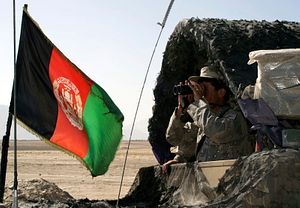On August 10, as more than 1,000 Taliban fighters stormed Ghazni City in southeastern Afghanistan, a Taliban political delegation was wrapping up a four-day foray to Tashkent, Uzbekistan. The two events — a negotiation and an assault — reflect the two dominant features of the convoluted pathway toward stability in Afghanistan: talking and killing.
In February, NATO Secretary General Jens Stoltenberg said that he believed there was no military solution to the conflict in Afghanistan but that a “strong Afghan force” was necessary to “create the conditions for a political solution.”
“Taliban has to understand that they will never win on the battlefield,” he went on. “[S]o they have to come to the negotiating table and agree to a political solution. That’s the reason why we are providing military support, it’s to enable a political solution.”
First killing, then talking.
As the battle for Ghazni continues, it seems evident that the Taliban has a similar formula. The Taliban, which has not ceded its aims to be a relevant political player in the country, nevertheless has also not sworn off the use of violence to further improve its position — nevermind the successful ceasefire in June.
So, how do the Uzbek talks factor into this stalemate?
Uzbek President Shavkat Mirziyoyev, since coming into office in late 2016, has put effort into not just mending relations with the country’s Central Asian neighbors, but boosting relations with Afghanistan in particular. In March, Tashkent hosted a conference specifically to discuss the Afghanistan conundrum. The usual suspects descended on Tashkent and the final declaration featured the now-standard phrases regarding an “Afghan-led and Afghan-owned” peace process. The Taliban deigned not to attend, but Tashkent opened the door.
From August 7 to 10, a delegation of Taliban led by Sher Mohammad Abbas Stanikzai, the Taliban’s Qatar-based political chief, traveled to Uzbekistan. The delegation reportedly met with Uzbekistan’s Foreign Minister Abdulaziz Kamilov and Uzbekistan’s special representative to Afghanistan Ismatilla Irgashev. Few details of the discussion have emerged, with the Uzbek Foreign Minister keeping it short, a two-line statement noting that “the sides exchanged views on prospects of the peace process in Afghanistan.”
In a statement to RFE/RL’s Radio Mashaal, the Taliban said the talks included a range of issues from the withdrawal of international forces from Afghanistan to Uzbek development projects in Afghanistan
Afghan President Ashraf Ghani traveled to Tashkent last December. One outcome of his meetings with Mirziyoyev was renewed energy behind mutually beneficial projects, in particular expanding existing rail links from the short Afghan-Uzbek border toward Iran by way of Herat and boosting the electricity trade as well.
As TOLO News reported neither Uzbekistan or the Taliban mentioned the powers-that-be in Kabul in their limited statements.
Speaking to the Associated Press, Andrew Wilder, vice president of Asia programs at U.S. Institute of Peace, commented that it would not be helpful “if the Uzbek efforts to facilitate lines of communication with the Taliban are not closely coordinated with the Afghan government.”
“High profile talks by foreign governments with the Taliban that exclude the Afghan government risk providing too much legitimacy to the Taliban without getting much in return,” he continued.
The Afghan government, via Ehsanullah Taheri, the spokesman of Afghanistan’s High Peace Council, confirmed that Tashkent had Kabul’s blessing for the meeting with the Taliban. The “Afghan government welcomes any effort regarding the Afghan peace process, especially those attempts which can lead us to an Afghan-owned and Afghan-led peace process,” Taheri reportedly said on Sunday.
There’s a degree of self-interest apparent behind Tashkent’s hosting of the Taliban for talks. First, Uzbekistan wants its development projects to move forward without fear of attack. In the past, the Taliban has pledged to not strike projects that benefit Afghanistan, but this has not always held up in practice. Second, Uzbekistan’s concerns about the threat of the Islamic State — which claimed responsibility for an attack in neighboring Tajikistan only two weeks ago — far outweigh its concerns about the Taliban. The Taliban has always been, and remains, focused on Afghanistan; the Islamic State, on the other hand, has global ambitions and presents a more direct threat to Uzbekistan than even a Taliban-controlled Afghanistan. The Taliban itself has taken to attacking nascent Islamic State-linked outfits in Afghanistan, even as some former Taliban boost their ranks.
The self-interest isn’t Uzbekistan’s alone. The Taliban can use a more neutral partner in bridging the gap that exists between the group and the Afghan government than those it already has in Islamabad, for example. The Taliban have formed conduits to a variety of actors from the group’s traditional partners in Pakistan to Russia, China and now Uzbekistan. Even the United States has pursued preliminary talks with the Taliban. Although all the parties mentioned above have committed to an “Afghan-led, Afghan-owned” peace process, the Taliban remains obstinate about negotiating with the Afghan government while foreign troops remain in the country.
All the talking aside, there’s another significant gap to be bridged: The gap that exists between what the Taliban’s political office in Qatar says, and what its commanders — say, in Ghazni this week — do on the ground in Afghanistan.

































